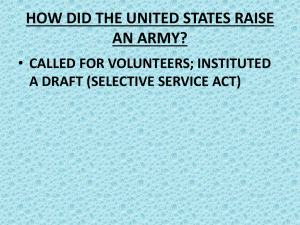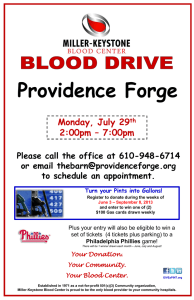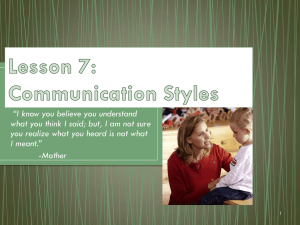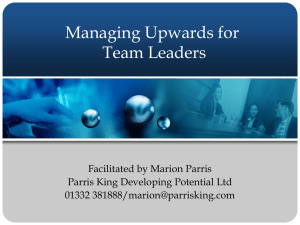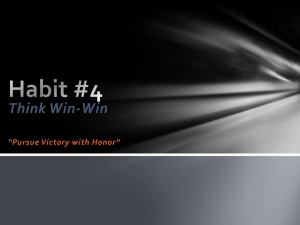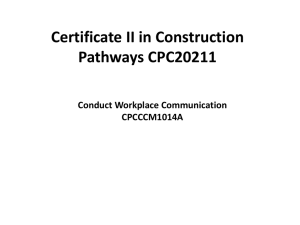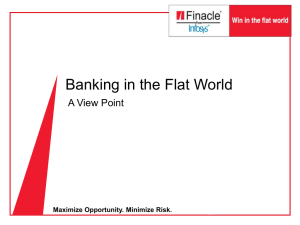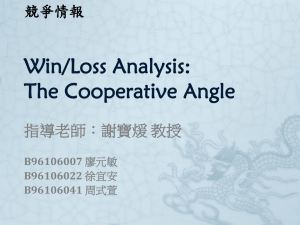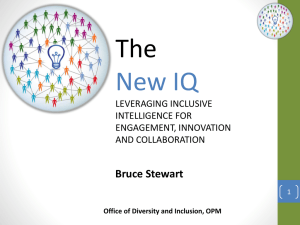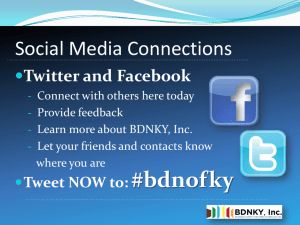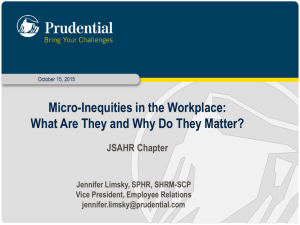Micro Behaviors
advertisement
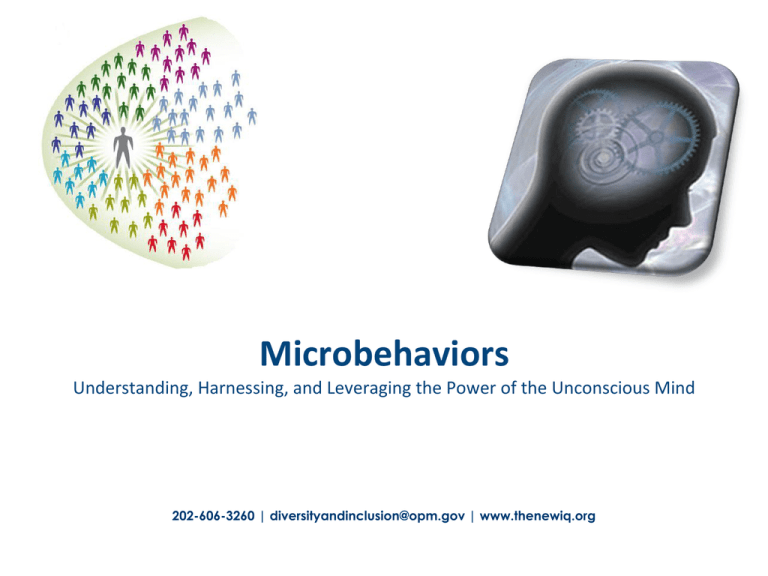
Microbehaviors Understanding, Harnessing, and Leveraging the Power of the Unconscious Mind 202-606-3260 | diversityandinclusion@opm.gov | www.thenewiq.org Test Your Attentiveness Wrong mental maps lead to wrong solutions which lead to lost resources http://www.youtube.com/watch?v=Ahg 6qcgoay4 2 2 The Titanic 3 Newspapers from the time estimated the size of the iceberg to be between 50 to 100 feet high and 200 to 400 feet long. Titanic was navigable for awhile and could have pulled aside the iceberg. Many people could have climbed aboard it to find flat places to stay out of the water for the four hours before help arrived. Fixated on the fact that icebergs sink ships, people overlooked the size and shape of the iceberg (plus the fact that it would not sink. 4 Challenging Your Mental Map The first step to challenging your mental map is understanding the goal… Inclusion! 5 Inclusion is… "the degree to which an employee perceives that he or she is an esteemed member of the work group through his or her needs for belongingness and uniqueness." 6 Two Important Aspects of Inclusion Brewer's Optimal Distinctiveness Theory (ODT). This theory essentially explains the tension that people experience between the need to be a unique individual and the need to belong with others. Uniqueness Inclusion Belonging It is believed that this tension between belongingness and uniqueness is an underlying theme diversity and inclusion literature 7 Brewer's Optimal Distinctiveness Framework High value in uniqueness Low value in uniqueness Low Belongingness High belongingness Differentiation: Inclusion: Individual is not treated as an organizational insider in the work group but their unique characteristics are seen as valuable and required for group/ organization success. Individual is treated as an insider and also allowed/ encouraged to retain uniqueness within the work group. Exclusion: Assimilation: Individual is not treated as an organizational insider with unique value in the work group but there are other employees or groups who are insiders. Individual is treated as an insider in the work group when they conform to organizational/ dominant culture norms and downplay uniqueness. Individuals experience feelings of inclusion when a high value is placed on uniqueness with a corresponding high value on belongingness 8 9 Why do we need diversity and inclusion? Wisdom of the Crowds http://www.youtube.com/watch?v=r-FonWBEb0o 10 The Diversity Trumps Ability Theorem The Difference by Scott Page Mathematical Truth “collective ability equals individual ability plus diversity and that diversity trumps ability” 11 11 When all you have is hammers… 12 Everything looks like a nail… 13 We can do more with an assortment of tools… 14 In with the New and out with the Old… Old IQ Individual Smarts is less important New IQ Group Smarts is most important 15 The New IQ = Inclusion Quotient Measures Inclusive Intelligence: The New IQ The intentional, deliberate, and proactive acts that increase work group intelligence by making people feel they “belong” and are “uniquely” valued. 16 We are Smarter like this… Win Win Win Win An interactive networked organization A stable, robust, highperformance system Win Win Win Win Win Win Win Win Win Win Win Win Win Win Win A Positive-Sum Game Win Win Win Win Win 17 We are less Smart like this… 18 A hierarchical segregated organization And even less Smart like this… A fragile, unstable, lowperformance system A Zero-Sum Game 19 What are barriers to inclusion? 20 Micro-Inequities are…. Usually generated by our unconscious mind Small messages of prejudice Often subconscious Subtle in nature Verbal or non-verbal 21 Social Biases that create silos and limit our potential… “Like Me” Bias “Confirmation” Bias 22 What Activates Our Biases? Our biases are most likely to be activated by four key conditions: Stress Time constraints Multi-tasking Need for closure 23 Micro-inequities • Micro-inequities In 1973, while researching racial and gender exclusion in the workplace, Mary Rowe, Ph.D., discovered women and people of color were bothered by subtle, seemingly harmless messages of devaluation that kept them from flourishing. 24 How Do Subtle Slights Impact Your Business? In 2006, companies lost $64 billion dollars from employees quitting their jobs due to “unfair treatment.” Damages your company’s recruitment & retention efforts Lowers employee morale and productivity levels 25 Better understanding of the different aspects of micro-inequities • Micro-messages: Social Signals we send to one another through our behavior. They are called “micro” or “subtle” because the behaviors are small, although their impact can be enormous. • Micro-inequities: Subtle slights we send other people that cause them to feel devalued, slighted, discouraged or excluded. • Micro-affirmations: Supportive signals that cause people to feel valued, included, or encouraged. 26 Examples of Micro-inequities • Constantly being interrupted while you are talking • Being left out of a discussion/project • Trying to speak with someone who is reading/sending emails during conversation • Talking with someone who keeps looking at his/her watch • Not being introduced in a meeting and then being ignored 27 Examples of Micro-inequities • • • • Rolling of the eyes Cutting down ideas before they can be entertained Staying on the cell phone with no explanation Mispronouncing your name or misspelling your name 28 How do we create inclusive environments? 29 Becoming a Trim Tab at Work • Identify common themes • Using workbook write down examples from video Discussion of FranklinCovey Trim Tab Video When thinking about “how can I possibly create change in my organization,” think of being a trim tab. Your small actions, your work in your circle of influence can create, over time, a big impact on your organization. 30 3 Small Steps to Creating Habits 1. Shrink the change 2. Find a spot 3. Train the cycle everyday 31 32 33 34
